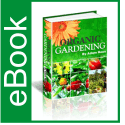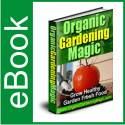Maintaining a Stable and Healthy Organic Garden in Raised Garden Beds
Maintaining a Stable and Healthy Organic Garden in Raised Garden Beds
Article by Joseph O.
Your organic garden including raised garden beds has a small ecosystem with numerous life forms that contribute to the production of the garden. These life forms can be categorized into “bad bugs” which eat your plants and the “good bugs” which eat the “bad bugs”.
A balanced and stable organic garden in a raised garden beds ecosystem needs a correct proportion of “good bugs” and “bad bugs.” The trick is to manage the population in a way that best suits the production of your vegetables. This is done through general organic gardening practices and specific pest control practices when using raised garden beds.
Here are some General Practices you should do:
Match Vegetables with the Best Seasonal and Soil Conditions
When growing vegetables on raised garden beds it is important for plants to be healthy and growing in optimal soil and climate conditions. It is because sick and stressed plants attract more pests and diseases than healthy plants and they are also less productive. Over watered and over fertilized plants are just as prone to pest and disease problems as under watered and under fertilized plants.
Practice Successional Planting and Crop Rotation
Many vegetables belong to the same plant families. Broccoli, Cabbage, Cauliflower, Brussels sprout, Kale and Turnip belongs to the Brassicaceae family, while Tomato, Capsicum, Eggplant and Potato are part of the Solanaceae family. Many pests are attracted to plants in the same family, and growing related plants in the same position in your raised garden beds can lead to problematic pest and disease outbreaks. This can be minimized by rotating plants from different families through each planting position over time. You can plant Snap Pea (Fabaceae) in winter, followed by Tomato (Solanaceae) in spring, then Celery (Apiaceae) in autumn and Broccoli (Brassicaceae) in winter.
Add organic matter
Adding organic matter to your raised garden beds helps break pest and disease cycles. Properly made compost such as composted cow manure and green manure are all good sources of organic matter.
Use seaweed sprays regularly
Sasol and Maxicrop are both seaweed-based plant conditioning sprays that are amazingly effective at maintaining healthy and vigorous plants in your raised garden beds. Spray your plants every fortnight.
To know more on how to maintain a stable and healthy organic garden in raised garden beds, visit http://www.ezyvegies.com.au/
About the Author
The author is a computer professional who works on the internet helping Ezyvegies increases its viewers through optimization. For world class raised garden beds visit us online http://www.ezyvegies.com.au/
Use and distribution of this article is subject to our Publisher Guidelines
whereby the original author’s information and copyright must be included.

 June 27, 2012
June 27, 2012 







